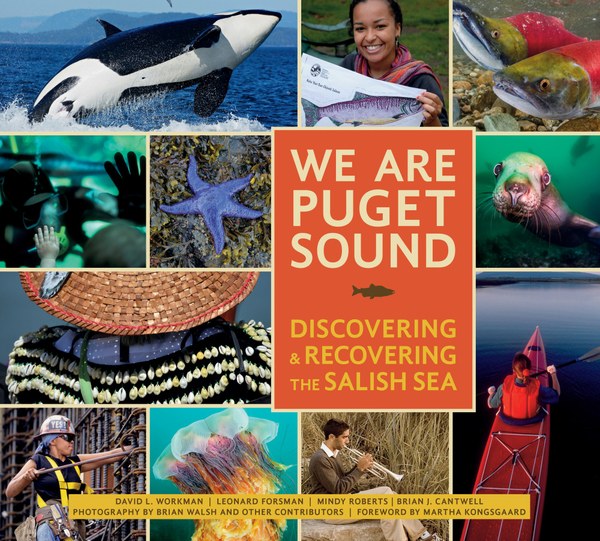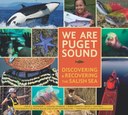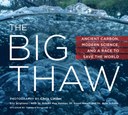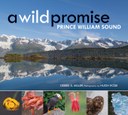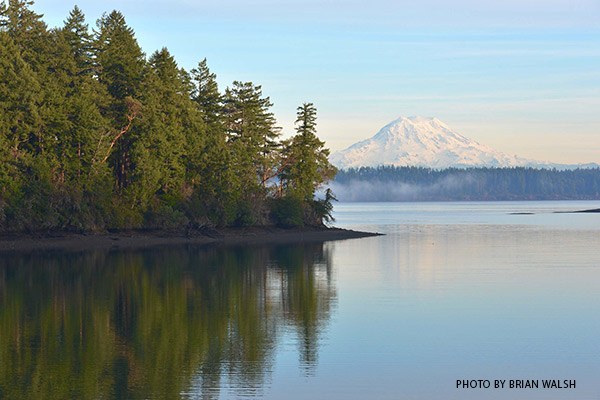
The following is excerpted from We Are Puget Sound, a new book from Mountaineers Books conservation imprint, Braided River. We Are Puget Sound highlights the ways in which we are affected by and dependent on this body of water—the beating heart of the region.
Join the conversation on November 19 at Town Hall Seattle with book contributors Leonard Forsman, Suquamish Tribal Chairman, and Mindy Roberts of Washington Environmental Council—as well as Orca Recovery Task Force co-chair Les Purce, and other regional Puget Sound protectors.
We Are Puget Sound
“I think I heard a whale blow!”
The young woman standing next to the rail on the Washington State Ferry Kennewick looked out across Admiralty Inlet to scan for the telltale signs of orcas, or killer whales. On this rare clear January day in 2018, sunshine bathed the labyrinthine patterns in the surface currents with light. In this turbulent passage, nearly all of the water within Puget Sound is exchanged with that of the Straits of Juan de Fuca and Georgia, an area that altogether is collectively known as the Salish Sea.
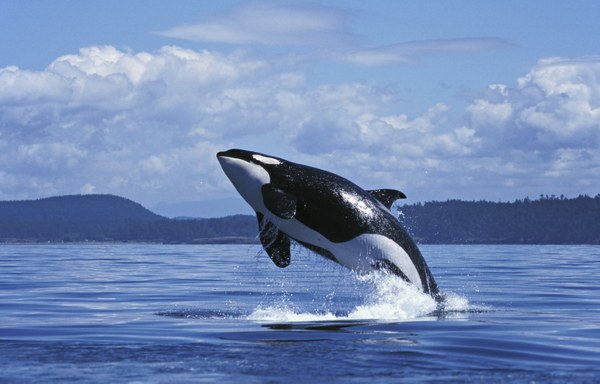 Puget Sound serves as habitat for both transient and resident orcas. (Photo by Brandon Cole)
Puget Sound serves as habitat for both transient and resident orcas. (Photo by Brandon Cole)
“There they are! Next to the sailboat! Orcas!”
The passengers on the upper deck all dashed to the port side to watch four orcas, including one juvenile, surface and blow—one even spy-hopped. The oohs and aahs sounded like people watching fireworks. For a nominal fee to ride the ferry, passengers were treated to a spectacular whale-watching outing, albeit one that did not slow down for a long look. Snippets of conversation revealed that a few passengers were tourists but most were people who lived in the Puget Sound region. Another woman remarked to her companion, “I feel honored to witness this.” The squeals, animated talking, and rapid snaps of photos indicated that the feeling was shared.
Moments like this are what tie many of us to this wondrous place. Yet they also bring into sharp relief the struggle of the Southern Resident killer whales, orcas that subsist almost entirely on chinook, not only to thrive but survive in the Salish Sea, raising questions about the future of our region, and the orcas. Here in Washington, we have a strong foundation for action at the state and local levels—hopefully at the federal level, too—and we have the technology we need to do so. Yet we are not making progress fast enough, and the Southern Resident orca population has continued to decline, to seventy-four individuals at the time of this writing. For us at Braided River and Washington Environmental Council, the question is not “Can we?” but “Will we?”
Will we reverse the stunning decline of chinook salmon, on which people and orcas feed? Will we implement modern controls on stormwater that collects toxic substances which in turn drains into the Sound where those substances accumulate in the fatty tissue of orcas? Will we address the disruption that vessels, including ferries, pose to orcas? Will we discuss with our friends and neighbors why we value the Sound? Will we stand up and demand that our elected officials prioritize and champion the health of the Salish Sea? Will we fund the programs needed for Puget Sound protection and recovery?
Over ten years ago, then-governor Chris Gregoire established 2020 as the target date to achieve recovery of Puget Sound. Yet political will and public engagement have lagged. For the Salish peoples who have called our region home for millennia, this place is known simply as Whulge, a Lushootseed word that means “saltwater.” Native American and First Nations communities were, and still are, connected by canoes that ply the near and far waters of Puget Sound, the entire Salish Sea, and the Pacific Ocean. These journeys forge deep connections, strengthen relationships, serve as shared spiritual events, and fuel trade.
Construction at Seattle’s West Point wastewater treatment plant in 1994 revealed stones carved more than three thousand years ago. Unique to the central British Columbia coast, these artifacts remind us of the longevity of the relationships between the peoples and communities around us.
Today’s residents include Native Americans and First Nations peoples, as well as later transplants from faraway lands. In the 1850s, settlers of European descent lived alongside native peoples, but also battled over land and resources. This struggle over the resources of the region continues to this day. The population now exceeds eight million people—millions of individuals seeking economic opportunities and a sense of well-being—and we expect the US portion of the population to double over the next fifty years. Future residents will want clean water and clean air, safe and affordable homes, and diverse and sustainable economic opportunities. How do we grow while preserving shared cultural values, abundant natural resources, and wildlife?
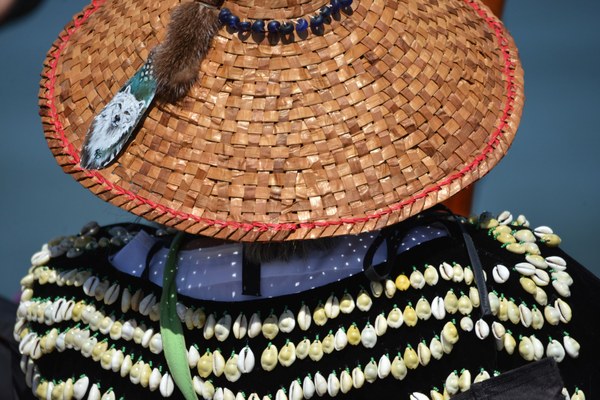 Tribal regalia at the 2016 Paddle to Nisqually celebration. (Photo by Brian Walsh)
Tribal regalia at the 2016 Paddle to Nisqually celebration. (Photo by Brian Walsh)
We are honored to bring you this book. Our goal is to strengthen public engagement and build the political will necessary to make the recovery effort a success through an exploration of the people and places of our Sound. The actions needed to support orca recovery will, in turn, address pollution and habitat problems that threaten our future. This book reminds us of the inspiring people, places, and natural creatures that define our region, and what is at risk if we do not succeed. Now is the time for a renewed focus on Puget Sound and, by extension, the Salish Sea.
The orcas are our canary in the coal mine—an indicator of the overall health of our region. The 1989 Exxon Valdez oil spill in Alaska seriously affected two pods, one of them resident and the other transient, in Prince William Sound. The following year, the affected resident group declined by 33 percent while the transients declined by 41 percent. The affected transient pod no longer has any reproductive-age females, so it is on track to become extinct. The 10.8 million gallons of oil that coated Prince William Sound for months now seem a distant memory, as do the widespread calls to action that emerged following the spill, as people fought for safety protections and asked why, as a nation, we were not transitioning to clean energy faster. Yet the reality is that oil remains in the sediment of Prince William Sound, fisheries have declined, and the resident orca population has declined significantly.
Change takes public pressure to happen and it moves slowly. The good news is that as we recognize the negative impacts past practices have had on natural resources—and on people— we are making progress. We stopped dumping industrial waste directly into places like Commencement Bay in Tacoma, and life is returning even to Superfund sites like the Thea Foss Waterway, the inlet connecting the bay to the Tacoma tideflats. Shellfish beds that were closed because of bacterial pollution are being reopened with the help of community-based support and solutions. Changing habits will ensure that working forests and farms continue to support rural economies. By adopting new practices, our community can continue to grow while maintaining the natural resource web that defines our region and us.
 A pod of orcas gathers at sunset. The Southern Resident orcas belong to a large extended family made up of three pods, J, K, and L. Within pods, grandmothers or great-grandmothers occupy a central role in the family structure. (Photo by Brandon Cole)
A pod of orcas gathers at sunset. The Southern Resident orcas belong to a large extended family made up of three pods, J, K, and L. Within pods, grandmothers or great-grandmothers occupy a central role in the family structure. (Photo by Brandon Cole)
We protect what we love, we love what we know, and we know what we see. Our hope is to grow the chorus of voices who actively value and protect this wonderful place. We are Puget Sound. We need your help to accelerate Puget Sound’s recovery. That’s the only way we will succeed in preserving the people, places, and orcas for future generations to enjoy.
* * * * *
By Helen Cherullo, Mountaineers Books Publisher, and Mindy Roberts, Washington Environmental Council Puget Sound Director
Learn more at wearepugetsound.org, and join in the conversation in person at Town Hall Seattle on November 19!
 Helen Cherullo
Helen Cherullo
 Mindy Roberts
Mindy Roberts
